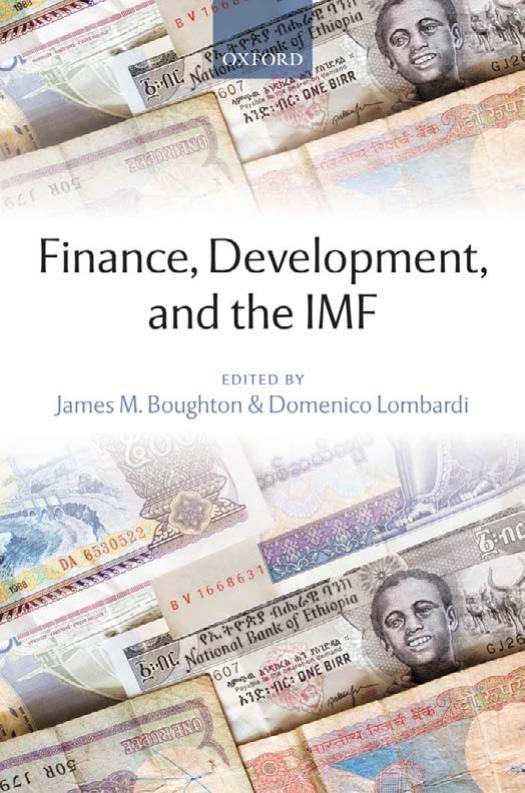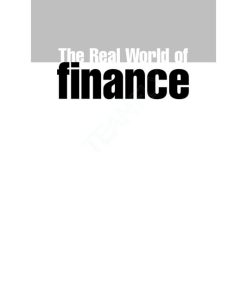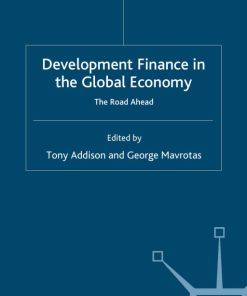Finance Development and the IMF 1st Edition by James Boughton, Domenico Lombardi 019923986X 9780199239863
$50.00 Original price was: $50.00.$25.00Current price is: $25.00.
Authors:James M. Boughton, Domenico Lombardi , Series:Management [664] , Author sort:James M. Boughton, Domenico Lombardi , Languages:Languages:eng , Published:Published:Jan 2010 , Publisher:Oxford University Press, , Comments:Comments:Oxford University Press, USA
Finance Development and the IMF 1st Edition by James Boughton, Domenico Lombardi – Ebook PDF Instant Download/Delivery. 019923986X, 9780199239863
Full download Finance Development and the IMF 1st Edition after payment
Product details:
ISBN 10: 019923986X
ISBN 13: 9780199239863
Author: James M. Boughton, Domenico Lombardi
This book provides an assessment of the role of the International Monetary Fund in poor countries. In recent years, a large portion of the work of the IMF has focused on the economies of low-income countries by aiming to create conditions conducive to poverty reduction and stable economic growth. More than two fifths of the IMF’s 185 members are low-income countries and many others have substantial pockets of poverty in their populations. Since economic development and the reduction of poverty are the most important economic challenges that these countries face, how can the IMF best help them? How can the imperative of macroeconomic and financial stability be reconciled with the requirements for sustained economic growth? This volume brings together the research of leading economists, political scientists, and historians to suggest ways for the IMF to address these issues effectively
Finance Development and the IMF 1st Table of contents:
Part I. Introduction
1. The Role of the IMF in Low-Income Countries
I. Introduction
II. History and nature of the role of the IMF in low-income countries
III. IMF policies and financing in low-income countries
IV. The role of low-income member countries in the governance of the IMF
V. Concluding observations
Part II. History and Nature of the Role of the IMF in Low-Income Countries
2. Bretton Woods and the Debate about Development
I. Introduction
II. Bretton Woods
III. The clash of ideas
IV. The sociology of politics
V. Managing the international financial system
VI. Approaching the international system
VII. More than balance of payments
VIII. The first red herring: commodities
IX. The second red herring: reserves
X. Conclusion: the preconditions of policy reform
XI. References
3. Lending to and for the Poor: How the IMF’s Role Has Evolved
I. Introduction
II. Lending to the poor
III. Lending for the poor
IV. Concluding observations
V. References
4. The Case for a Universal Financial Institution
I. The evolution of the IMF and its membership
II. Financial classification of countries
III. The modern role of the IMF
IV. Concluding thoughts
V. References
5. The Role of the IMF in Low-Income Countries: An Institutional Approach
I. Introduction
II. Understanding the role of the IMF in low-income member countries
III. Lending policies for low-income member countries
IV. Challenging aspects of IMF lending policies
V. IMF surveillance
VI. Challenging aspects of IMF surveillance
VII. Concluding remarks
VIII. References
Appendix
Part III. IMF Policies and Financing in Low-Income Countries
6. Financier or Facilitator? The Changing Role of the IMF in Low-Income Countries
I. Introduction
II. IMF arrangements in low-income countries
III. What motivates IMF programs in low-income countries?
IV. Balance of payments strategy in low-income countries: in pursuit of the optimum blend of adjustm
V. Assessing the IMF’s role in pursuing the optimum blend
VI. Relaxing the external financing constraint: the IMF and foreign aid
VII. Is the role of the IMF in low-income countries changing?
VIII. Should the Fund retain an independent financing role in low-income countries?
IX. Concluding remarks
X. References
7. The IMF’s Approach to Macroeconomic Policy in Low-Income Countries
I. Introduction
II. The pros and cons of IMF loans to low-income countries
III. Towards a more flexible macroeconomic approach
IV. Debt sustainability
V. Technical assistance
VI. Conclusion
VII. References
8. Signaling, Aid, and IMF Financial Arrangements for Low-Income Countries
I. Introduction
II. The IMF “seal of approval”: rationale and implications
III. The financing gap
IV. Conclusions
V. References
9. Debt Relief in Low-Income Countries: Background, Evolution, and Effects
I. Introduction
II. What are “debt problems”? And why do they arise?
III. How can debt problems be handled?
IV. The build-up of debt in low-income countries during the 1980s and 1990s: underlying causes
V. The response of creditors to low-income countries’ debt: from rescheduling to relief
VI. Debt relief: the underlying issues applied to low-income countries
VII. The effects of debt relief on low-income countries
VIII. The future of debt policy: the role of the IMF
IX. Concluding remarks
X. References
10. The Role and Performance of the IMF in Aid to Low-Income Countries: Lessons from Evaluation
I. Introduction
II. Accommodation of aid in PRGF program design
III. Forecasting, analysis, and mobilization of aid
IV. PRGF key features
V. External communications
VI. Conclusions and postscript
VII. References
11. Participation in IMF Programs and Income Inequality
I. Introduction
II. Definitions, methodology, and data
III. Cross-sectional income inequality in developing and transition countries
IV. Measuring the intertemporal impact of participation in IMF programs on income inequality
V. Conclusions and extensions
VI. References
Appendix
Part IV. The Role of Low-Income Member Countries in the Governance of the IMF
12. Governance Matters: The IMF and Sub-Saharan Africa
I. Introduction
II. Why does governance matter?
III. Setting priorities: the IMF’s approach to Africa
IV. Implementing policies without responsiveness
V. To whom should the institution be accountable?
VI. References
13. Proposing IMF Reforms for Low-Income Countries
I. Introduction
II. Why do governance reform proposals have less output value to low-income countries?
III. What kinds of reforms would low-income countries benefit from at the IMF?
IV. Why the IMF reform debate is concerned more with governance than with functional reforms
V. References
14. Rethinking the Governance of the International Monetary Fund
I. Introduction
II. Quotas, voice, and Rawls
III. Rawls’s method
IV. The way forward
V. Conclusion
VI. References
People also search for Finance Development and the IMF 1st:
finance and development imf
finance and development
finance and development magazine
imf finance and development













